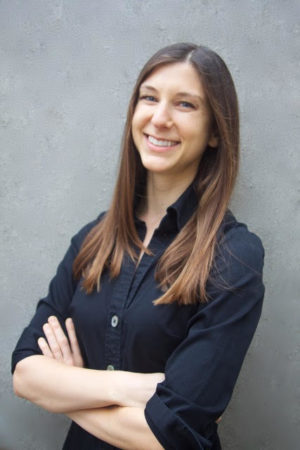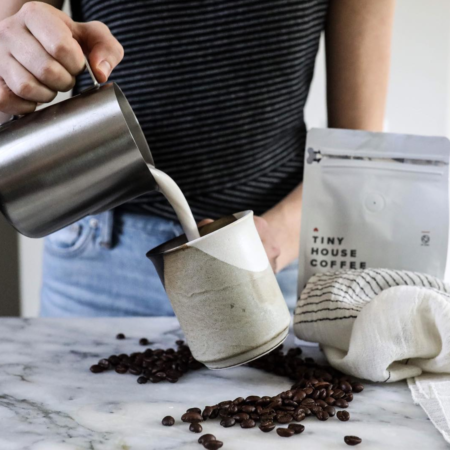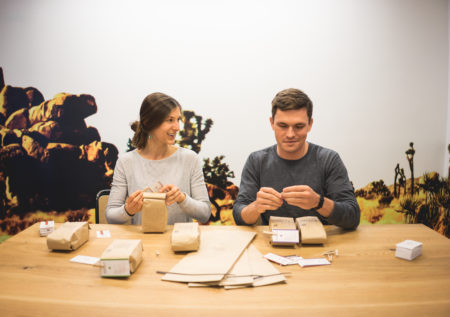Tiny House Coffee Roasters’ Helen Schafer reflects about her company’s growth.
By Saba Ghaffari, Photos courtesy of Helen Schafer

North Carolina native Helen Schafer never imagined she would have the life she does today. As co-owner of sustainable microroastery Tiny House Coffee Roasters, Schafer oversees a small team of employees at its Buda, Texas, headquarters. While her team manages the operational functions of the business, like roasting beans, preparing cold-brew coffee and packaging products for delivery, Schafer focuses on sales and marketing, spending her days meeting with potential clients.
Upon graduating from the University of Miami with a degree in exercise physiology, Schafer joined the Peace Corps. She traveled to Nicaragua, where she acted as a community health educator, working to reduce the prevalence of HIV in the area and adolescent-pregnancy rates. During her time with the Peace Corps, Schafer met Blake Thomas, a fellow volunteer, who would later become her boyfriend and business partner. Together, the pair traveled the country educating migrant coffee pickers about HIV transmission and prevention.
While making these health-care interventions, Schafer and Thomas also learned about the various challenges Nicaraguan coffee farmers face, such as lack of accessibility to the United States coffee market. Typically, these coffee farmers sell to large exporters, who sell to importers, who then bring the coffee to the U.S. In Nicaragua, coffee farmers take out loans at the beginning of each year. The price of coffee fluctuates depending on the market value, but since the coffee harvest is only once a year, when the farmers harvest, they often cannot afford to sit on the coffee due to the loans they have to repay. Schafer observed coffee farmers barely breaking even or making slim profits because they had to sell their coffee at whatever the market dictated at the time of harvest.
 After learning about the supply side of coffee production, Schafer and Thomas began coming up with a business plan. By removing the importers and exporters from the equation and purchasing directly from the source, they could produce a higher quality coffee while mutually benefiting local coffee farmers.
After learning about the supply side of coffee production, Schafer and Thomas began coming up with a business plan. By removing the importers and exporters from the equation and purchasing directly from the source, they could produce a higher quality coffee while mutually benefiting local coffee farmers.
When Schafer and Thomas returned home in July 2014, they began to research. The two experimented with roasting coffee in a North Austin garage, burning plenty of batches before perfecting the process. By November 2014, Tiny House Coffee Roasters was officially formed as a business, and the following summer, Schafer and Thomas began roasting and selling Nicaraguan coffee beans atlocal farmers markets.
The company’s mission is to help coffee farmers, which is why its focus is on microlots. Schafer explains much of the inspiration comes from the tiny-home philosophy.
It’s about “just being efficient and sustainable,” Schafer says. “So, that’s what we really try to do when we source our coffee.”
Although Tiny House Coffee Roasters has grown and achieved success, the journey has not been without its challenges.
“A big thing is definitely capital,” Schafer says. “Not having capital has definitely made it very self-funded for us from the get-go, so that was a big issue, and it’s a lot of risk too. Also, logistics: figuring out how to get coffee from these countries to the U.S.”
But the rewarding moments make it all worthwhile, such as when Schafer receives photographs of the farmers she’s helping support.

“[It’s] moments like that, where we actually really did make a difference in these guys’ lives [that most matter],” Schafer says.
Schafer and Thomas source their beans directly from Nicaraguan coffee farmers and are continuing to grow their product line. Two years ago, the pair added a larger variety with beans from Ethiopia, Kenya, Costa Rica, Guatemala, Columbia and Brazil. While they do not have direct trade relationships with farmers in these other countries, they always ensure they source from small coffee farms. They also now offer cold-brew coffee.
“We’ve really perfected this cold-brew recipe,” Schafer says. “It’s huge in Austin.”
The Tiny House Coffee Roasters cold-brew keg program launched in summer 2016, and Schafer and Thomas deliver ready-to-drink cold-brew coffee in five-gallon kegs to cafés, restaurants and Austin businesses.
Schafer attributes much of her company’s growth and success to word-of-mouth.
“We’re such a small company, so we don’t have a huge advertising budget,” Schafer shares. “A lot of our business has been through referrals.”
For more information about Tiny House Coffee Roasters’ coffee subscriptions and whole-bean offerings, visit tinyhousecoffeeroasters.com.


